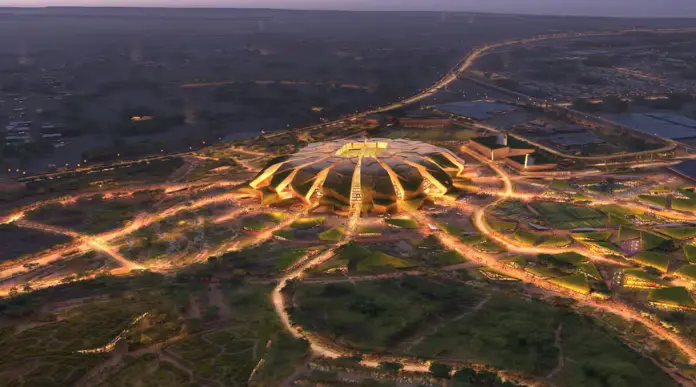The FIFA World Cup is one of the most popular sports events worldwide, with millions of viewers and the best athletes. Hosting such an event must meet certain requirements considering the conception of the structures, facilities, and environmental conditions of athletes and spectators. The bidding process is a critical factor in providing measures to ensure that air quality status will have a close or nil influence on the health and performance of athletes and fans.
Air Pollution in Saudi Arabia: A Growing Concern
According to available reports, Riyadh, Jeddah, and Dammam in the Kingdom of Saudi Arabia are suffering from worsening air quality. The World Health Organization has continuously rated Saudi Arabian cities among the most polluted cities in the world. These are PM2.5 and PM10, NO2, and SO2, which have links to industrial emissions, vehicles, and natural factors such as dust storms in the region.
Key Causes of Air Pollution in Saudi Arabia
Industrial Emissions: The country depends more on the oil and gas industry, and as a result, the emission of gases into the atmosphere is very high.
Vehicular Pollution: The population density because of rapid urbanization creates an exponential rate of vehicle ownership. Motor vehicle emissions are other of the primary sources of NO2 and PM through the burning of fossil fuels.
Dust Storms: Due to its hot and dry climate most of the regions in Saudi Arabia experience frequent dust storms which increase PM levels. These natural calamities pose a peculiar situation in combating and controlling air pollution.
Lack of Green Infrastructure: Little green cover in urban areas diminishes the capacity of the land to clean the air and add to this problem.
Effects on Performance as well as Welfare among Athletes
Definitive evidence shows that polluted air negatively affects athletes in the course of their performance. Here’s how air pollution affects athletes specifically:
Reduced Oxygen Uptake: Fine particulate matter and nitrogen dioxide both affect the ability of the body to transport oxygen, necessary for the highest levels of performance.
Increased Health Risks: Continual breathing of environmental pollution causes bronchitis, asthma, and problems of the heart. So it’s especially dangerous for athletes who are already under physical pressure.
Impaired Recovery: During or immediately after training or games, pollutants make the recovery process challenging as they increase inflammation and oxidative stress in the system.
Long-Term Effects: Constant exposure for 30 or so days in a month’s event such as the FIFA World Cup has severe health implications for players and their careers.
Adverse Effects on Spectators
Organizing the FIFA World Cup is not exclusively about the players, it is also about the fans attending the tournament. Air pollution poses significant risks for fans traveling from all over the world:
Health Risks: People who are not used to the air quality conditions in Saudi Arabia could fall ill, so common flu-like ailments that are usually associated with changed atmospheric air quality could affect children, the elderly, and any person with a pre-existing health condition.
Decreased Comfort: Pollution, which is obvious when watching live matches, creates discomfort such as sore eyes, coughing, and labored breathing, and reduces the enjoyment of watching those kinds of matches.
Economic Consequences: The impact of negative experiences arising from air pollution could deter international visitors leading to a bleak future for events and tourism in Saudi Arabia.
Problems in Controlling Air Pollution
Despite efforts to improve air quality, Saudi Arabia faces significant barriers to achieving this goal:
High Dependence on Oil and Gas: An unfortunate consequence of the country’s heavy dependence on fossil fuel in its economy is that attempts at diversification such as Vision 2030 are hampered by the slow rate at which the move to green energy is made.
Geographical Constraints: Dust storms are part of natural occurrences that cannot be entirely managed and therefore lead to inconsistency when it comes to the cleanliness of the air.
Insufficient Regulations: Although there are environmental policies, with regard to implementation and supervision they remain still insufficient, especially in the industrial field.
Urbanization: The process of urbanization is so advanced that environmentally safe measures are overwhelmed by pollution.
Global Comparisons: Air Quality Standards for Previous Hosts
A comparison with recent FIFA World Cup hosts highlights the stark contrast in air quality:
Russia (2018): Although people experienced polluted air mainly in industrial zones, restrictive legislation and environmental promotions provided tolerable atmospheric standards for the event.
Qatar (2022): Additional, measures to protect points of fans gather together such as stadium air conditioning and filters for the polluted urban air and heat helped to lower the rates to a significant extent.
Brazil (2014): Air quality in the major host cities was however preserved by urban greenery and stricter norms on vehicular emissions.
Ethical Considerations
Hosting the FIFA World Cup in a region with known air quality issues raises ethical questions:
Athlete Welfare: Thus, the following issues should be of primary importance: Exploiting athletes to low optimal conditions demeans the principles of merit and a deserving competition.
Spectator Responsibility: FIFA also has a responsibility to protect the fans most of whom spend their time and resources to attend the event.
Environmental Sustainability: FIFA’s avowal of going green may be threatened by providing the World Cup to countries with environmental problems.
Conclusion
It is good to see Saudi Arabia blowing its trumpet on its bid to host the FIFA World Cup in 2034; however, the problem of air pollution remains high and therefore not suitable. The risks resulting from the implementation of this event are dangerous to athletes’ and spectators’ health, the health of the environment, and other aspects of integrity that cannot be overcome by the advantages that the event brings to the region. In this regard, Saudi Arabia has notably progressed in economic and infrastructural reforms; nevertheless, the improvement of air quality is a question that could be considered to be a potentially eternal unfeasibility.













